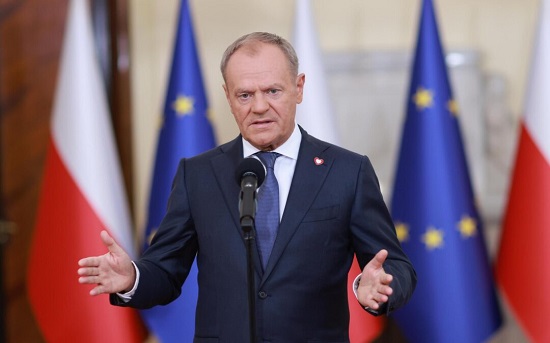“Asylum Rights are being abused,” says Tusk in a speech addressing the migration crisis.”
Polish Prime Minister Donald Tusk has announced plans to temporarily suspend asylum rights as part of his government’s new migration strategy. This move aims to curb the increasing number of irregular migrants crossing into Poland from Belarus.
Join our WhatsApp ChannelDuring a speech in Warsaw, Tusk emphasized that people smugglers were exploiting asylum rights. He claimed Belarus and Russia were using these migrants to destabilize the European Union. “We are witnessing a targeted abuse of asylum rights, orchestrated to undermine the stability of the EU,” Tusk stated.
Since 2021, Poland has seen a sharp rise in illegal border crossings, with thousands of migrants entering from Belarus. Many of these migrants come from the Middle East, Africa, and Asia. Warsaw has consistently accused Belarus and Russia of carrying out “hybrid warfare” by directing migrants toward EU member states—a claim both countries deny.
Suspension of Asylum Rights Proposed
Tusk laid out his migration plan, which includes the temporary suspension of asylum rights as one of its key elements. “We must regain 100% control over who enters Poland. This includes temporarily halting asylum rights to prevent further exploitation of our system,” he declared. Tusk intends to seek European recognition of this move, although it may conflict with Poland’s international obligations.
His proposal marks a continuation of the tough migration policies of the previous Law and Justice (PiS) government. Tusk’s centre-right Civic Coalition government has, surprisingly, maintained the hardline stance by upholding policies such as the 5.5-metre-high steel fence built along Poland’s border with Belarus.
This tough approach gained further momentum following the tragic death of a Polish soldier in July. The government passed new legislation allowing security forces to use firearms in self-defense during border control, further solidifying its stance on migration.
Asylum Rights Abuse and Humanitarian Concerns
Tusk’s justification for suspending asylum rights has sparked debate across Europe. He insists the move is necessary to address the root cause of irregular migration. “The asylum rights system is being abused by criminal networks. We cannot stand by while this continues,” he said.
READ ALSO: Myanmar Refugees Seek Peace Amidst Rising Human Rights Abuse In War-torn Country
However, rights groups are raising alarms. Many humanitarian organizations, including the Helsinki Foundation for Human Rights, argue that suspending asylum rights will worsen the crisis at the border. Malgorzata Szuleka of the Foundation stated, “This is a step in the wrong direction. It disregards human rights and ignores the dire situation of migrants stuck at the border.”
Since the border crisis began, over 130 migrants have died, according to NGO estimates. Many have criticized the Polish government for neglecting the humanitarian aspect of the crisis.
European Reactions and Further Discussions
Tusk’s proposal comes at a time when other EU countries are facing their own challenges with migration. Germany, in particular, has introduced checks on its border with Poland, fearing that migrants entering Poland could use it as a transit country. These actions underscore the growing migration pressure across Europe.
Tusk is expected to present the full details of his migration strategy, including the suspension of asylum rights, at a government meeting scheduled for October 15. While the proposal has garnered significant support within Poland, particularly among the public, its international implications remain to be seen.
Tusk’s decision to suspend asylum rights as part of his broader migration strategy highlights the complexities of managing irregular migration. While he argues that this move is necessary to prevent further exploitation, rights groups fear the humanitarian consequences. As Europe grapples with increasing migration challenges, Poland’s approach will likely set the tone for how other countries handle similar crises.












